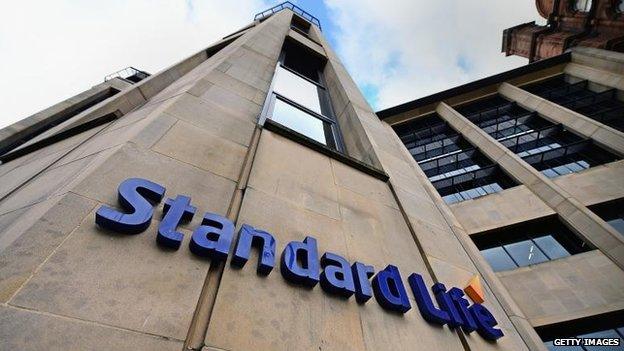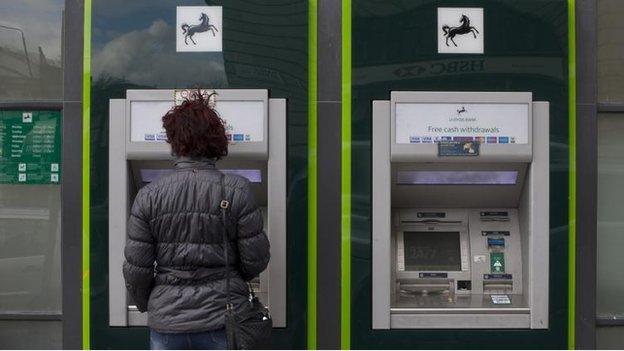EU law may force RBS and Lloyds to become English
- Published
- comments
Robert Peston explains why banks could be forced to move their registered offices
If Scotland were to vote for independence, both Royal Bank of Scotland and Lloyds may be forced to move their registered offices or legal homes to London under European Union law, I have learned.
A senior banker has told me that his organisation is taking legal advice on the impact of the relevant directive, Council Directive 95/26/EC of 29 June 1995, external, because it has never been tested in the courts and there is no case law around it.
Regulators are also busy assessing its significance. Bankers and regulators both tell me it is likely to mean that RBS and Lloyds would be obliged to move their homes south of the border, if Scotland were to go it alone.
The directive says that banks must have their head offices "in the same member state as its registered office".
It also implies that those registered and head offices should be located where a group has the bulk of its activities - which, as you know, is England for Lloyds and RBS.
One relevant part of the directive says that a regulator should prohibit a bank from operating where the "geographical distribution of the activities actually carried on indicate clearly that a financial undertaking has opted for the legal system of one Member State for the purpose of evading the stricter standards in force in another Member State within whose territory it carries on or intends to carry on the greater part of its activities".
Now it is very unlikely that the Prudential Regulatory Authority and Financial Conduct Authority in London would accuse Lloyds and RBS of keeping their registered offices in Scotland to deliberately evade "stricter" oversight by them.
But that may not matter. Because, as I understand it, they think this directive broadly implies that a bank must have its legal home in the country where it carries out the bulk of its activities - which in this case (to state the obvious) is England (or rather the rest of the UK, excluding Scotland).
Here is where I labour the point.
Lloyds already has its head office in London, separate from its Scotland registered office.
And RBS has two head offices, one in London, one in Scotland - and, to repeat (yawn), Scotland is its legal home.
The big simple point is that neither RBS or Lloyds would probably choose to move their head offices and important risk control functions back to Scotland: even if the regulators thought this was a good idea, their owners would not; which means that, on the basis of Council Directive 95/26/EC of 29 June 1995, their registered offices, their homes, would be coming to the City.

Standard Life has warned it could leave Scotland if it votes for independence
If you are still with me (many congratulations, by the way), you may be wondering why any of this matters.
Well for both sides in the battle over the future Scotland, the fact that two of the UK's biggest banks, Royal Bank of Scotland and Lloyds, have their registered offices or legal domiciles in Scotland has been a double edged sword.
On the one hand it appeared to be symbolically important for the Yes or pro-independence campaign that RBS and Lloyds have not followed the lead of the insurance company Standard Life, which recently suggested that it might have to move south of the border if Scotland voted to go it alone .
And maybe these banks' homes in Edinburgh speak to a vital future for Scotland's financial services industry and economy.
So to that extent no real news on their post-independence planning is implicitly good for Alex Salmond and those in favour of a separate Scotland.
However, the mainstream British political parties and the Better Together campaign have pointed out that banks occasionally run into financial difficulties (err, these two did, not that long ago, at a near-crippling cost to British taxpayers and the economy).
So Tories, Libdems and Labour, along with HM Treasury, have noisily pointed out that an autonomous Scotland would not on its own be able to bail out this pair of banks.
Here are the stats: Lloyds' and RBS's loans and investments are £1.9 trillion collectively, or between 13 and 15 times the value of Scotland's annual output or GDP (depending on how it's measured) - which suggests that Scotland would be bankrupted by the implied costs of rescuing these two banks and their depositors.
What matters is that the Treasury - and the cross party troika of George Osborne, Danny Alexander and Ed Balls - have cited these apparently unaffordable potential bail-out costs when explaining why they reject the demand of the Scottish government for a formal monetary union between an autonomous Scotland and the rest of the UK.
They say that it would be to trample on the interests of taxpayers in England, Wales and Northern Ireland to enter into a monetary pact with Scotland, which left these taxpayers implicitly exposed to the risks of rescuing two big banks, when regulators in London would not have been in a position to keep them prudent and healthy.

Both Lloyds and RBS do the majority of their business in England
And it is this refusal of the political establishment in London to countenance formal monetary union with Scotland which is seen by many to have dealt the greatest blow to Mr Salmond's separatist ambitions.
Or to put it another way, Lloyds' and RBS' home in Scotland can be seen as good and bad for both sides in the independence argument.
But if these homes would come to London more-or-less automatically in the event of a vote for separation, then it means that their future would no longer be part of the cut and thrust of the referendum battle.
And, on balance, it may be that the automatic nature of relocation to England would be worse for the pro-union campaign - because it means the financial risks of a monetary union with Scotland would reduced.
A banker said: "Salmond will never say this publicly, but he is bound to regard the depoliticisation of where we base ourselves as a good thing. He would no longer have the risk of picking up a big bill for us, if everything went belly up again".
All that said, it is no great surprise that neither side have been shouting that Scottish independence equals emigration to London of Lloyds and RBS.
But it does explain why neither Lloyds or RBS have felt compelled to say anything much about how they would respond to a popular decision in favour of separation - because their ability to choose their respective nationalities may be severely circumscribed, by EU law.
PS: If you are interested in the history of this tedious EU directive, which could have such a big impact on the referendum debate, it is commonly known as the post BCCI directive.
The directed was enacted to make sure that no bank could ever again be run along the lines of the criminal enterprise, BCCI, which had its registered office in Luxembourg, but most of its operations in London - and the Luxembourg regulator simply didn't have the resources to check what BCCI was up to, and the Bank of England felt it did not have the powers to do so.